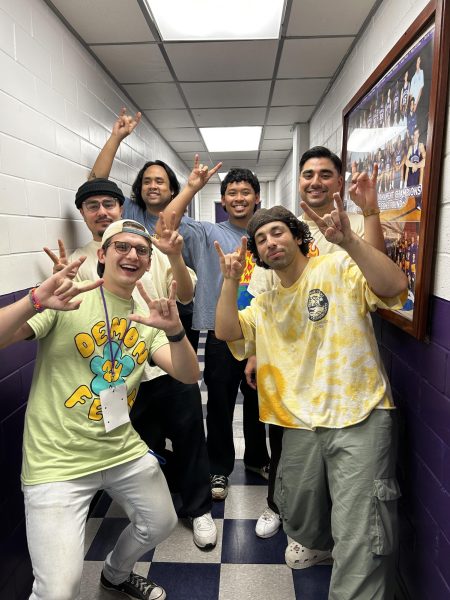Bias in the creative arts workforce
Generally, big schools receive more money from taxpayers, seeing as their districts have a higher cost of living. This allows more money in general, including money allotted to the bands.
A cold October morning sets the stage for the sparkling dewy mist that has settled on the leaves of the trees, the grass, the bushes and even the black instrument cases scattered around the perimeter of a black paved parking lot.
The parking lot is void of cars, instead occupied by dozens of high school students quietly setting up for practice. The sun begins to break through the tops of the trees, casting broken shapes across the ground.
A whistle sounds, students hasten their pace and grab their own instruments, hurrying out onto the black parking lot, painted over with the lines of a standard football field. Thus, morning rehearsal for your local high school marching band begins.
Marching band is an American staple, being an organization traveling with the school football team to nearly every game each Friday night, playing stand tunes throughout the game, and performing during halftime.
Coming from an East Texas 5A school that regularly competed in regional UIL and State competitions the entirety of my high school, I feel like I have a good grasp of the standards for high school marching bands and their competition.
Typically, going to the Dallas/Fort Worth area would humble our smaller bands, in terms of size, money and often in skill.
Generally, big schools receive more money from taxpayers, seeing as their districts have a higher cost of living. This allows more money in general, including money allotted to the bands.
Every year the competition goes up, and the cost of props, costumes, and equipment rises with the higher demand. Meanwhile, in the rural areas outside of Dallas, we have a smaller budget, and cannot do much in terms of keeping up with the monetary standards set within the cities.
This also applies financially to whom the bands will hire to help with the band. A lot of times a tech or outside person will be asked to guest teach for a day or for a section/feature in the show, just to add the skill those people have that otherwise would not have existed.
To hire reputed people who are often in high demand requires a lot of money, to give them transportation, housing and other accommodations in addition to their pay, all usually asked for on an upfront basis.
Among the community of directors, techs and designers, it’s easy to find people who are passionate and qualified. Many young adults leave high school and continue their careers in music via higher education. Many will go on to join college marching, and others will do both as well as go on to their dream DCI group if they haven’t already. Others will end it there and choose to focus on their music degree.
The issue then arises with the careers these young adults find themselves entering in being extremely picky. Not in the sense that the kids aren’t talented or qualified for the positions they aspire for, but that the employer has friends of friends who know someone who can do the job.
This also applies to regional factors, such as colleges near those schools. Not many people want to travel for their job or have to uproot themselves after or during college, so oftentimes employers or directors looking for quick and cheaper (being nearby cuts down on the travel expenses) talent.
This can easily be found nearby where there are high schools near colleges. Those high schools or private groups will pull young students from those schools, cutting down on the availability of students out of that range unless they ask for a cheaper price than the students close by, therefore losing money in the long run.
In the DFW area, this is very common. Most notably, a lot of the students studying at the University of North Texas are on Santa Clara Vanguard together, mainly their battery (drumline). This is a partially ideal situation because the drumline will have similar training and will therefore be more cohesive no matter which group they are with. But this also creates a bias towards outsiders.
So these qualities of DCI will create a situation where someone has credibility by word of mouth, simply by having marched Blue Devils 2019, in the winning show “Ghost Light”, or a hypothetical middle man knows a friend who teched the Sacramento Mandarins color guard in 2016 who would be perfect for this job.
Admirably, those statements are powerful, noteworthy, and awe-inspiring. Even I would be slightly biased in hearing those words about someone who was to be teaching me or another such thing. But there lies the issue.
What constitutes the difference in who did and didn’t march to a winning show? Or even a Drum Corps in general? I know hundreds of people who are just as talented- who could walk into a room, do a one-minute routine, and be cast on the spot for the world’s best organizations.
Say they couldn’t afford Drum Corps, didn’t have time to do Drum Corps or any other valid reason to not do Drum Corps. Are they then not as good as one who has? No, not at all.
Kids who spend hundreds of hours studying in the band hall till midnight or more, kids who willingly put themselves thousands of dollars in debt not to tour the country for three months, but to pursue a professional degree for four years, sometimes, even more, those kids deserve the same recognition as those who spend a summer away.
I want a director looking to expand their staff for their small 2A high school to look at a college student applying for this position and to see their degree in their area of choice and to feel confident that what they worked for was enough.
I want the next show designer of the Santa Clara Vanguard to look at a thin resume of a hard-earned graduate student and accept them without thought or question, and to pass up the name of a friend of a friend’s Instagram with thousands of views on their color guard choreography.
I want those small titles attached to a student’s name to equal the same as a Drum Corp necklace does for many others.
Therefore, I want the bias towards young adults in the workforce of the marching arts to be destroyed. I want the elite groups and the small social circles of reputed bands to be erased.
I want a lot of things, yet I know many of those are not easy to achieve. But me stating my opinion can do at least one thing. Change your mind. Simply respect the hard work many music students are putting in. This goes for all of the creative arts really.
Everyone is working just as hard as the others, and no matter the recognition, the exposure and the reputation. The proof of their place in this world should be enough to tell you that this student deserves your thought and consideration.
They are working for their right to be in this workforce, same as everyone else.
Now it’s the employers’ turn to realize the world is made by the younger generations, not tradition.



























